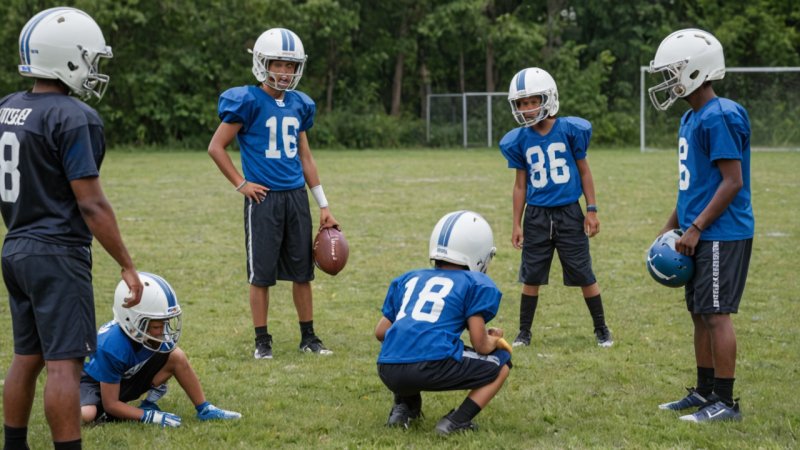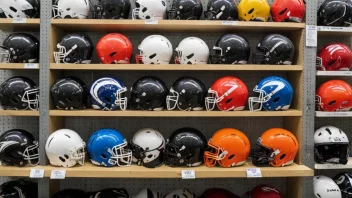In the world of youth sports, ensuring the safety and well-being of young athletes is a paramount concern for coaches, parents, and organizations alike. Football and rugby, while exhilarating and physically demanding, can pose significant risks if not approached with care and an emphasis on safety. Encouraging safe play among young athletes not only protects them from injuries but also fosters a positive environment that enhances their enjoyment of the game. By implementing safety protocols, educating young players about risks, and promoting a culture of respect and teamwork, we can establish a foundation that emphasizes both performance and safety in these contact sports.
Understanding the Importance of Safety in Youth Sports
The primary goal of youth sports should be the development of skills, physical fitness, and social interaction, all while having fun. However, the competitive nature of sports like football and rugby can sometimes overshadow the importance of safety. Injuries can range from minor sprains to more severe concussions, making it essential for coaches and parents to prioritize safety measures. Recognizing the impact of injuries on young athletes can be a driving force behind creating a safer playing environment.
Education and Awareness
One of the most effective ways to encourage safe play is through education. Coaches, parents, and players should be well-informed about common injuries associated with football and rugby, as well as safe practices to mitigate these risks. Providing training sessions that focus on:
- Understanding the rules of the game
- Recognizing the signs of injury
- Implementing proper techniques for tackling and blocking
- Learning about the importance of wearing protective gear
can go a long way in fostering a culture of safety. Additionally, workshops that include guest speakers, such as medical professionals or experienced athletes, can provide invaluable insights that help reinforce the message of safety.
Promoting the Use of Protective Gear
Protective gear plays a crucial role in preventing injuries in contact sports. Young athletes should be encouraged to wear appropriate equipment, such as:
- Helmets with proper fitting
- Shoulder pads
- Rib guards
- Visors or mouthguards
Coaches should emphasize the importance of wearing this gear at all times during practice and games. Conducting regular checks to ensure that the equipment is in good condition and fits properly can help prevent injuries caused by faulty or ill-fitting gear. Educating players about how the right equipment can protect them can motivate them to take safety seriously.
Creating a Safe Playing Environment
The physical environment where young athletes practice and compete also plays a significant role in their safety. Coaches and organizations should ensure that:
- The playing field is free of hazards, such as holes or debris
- Weather conditions are monitored to prevent heat-related illnesses
- Proper supervision is provided during practices and games
- Emergency plans are in place in case of injuries
By taking these measures, coaches can create a safe atmosphere that allows young athletes to focus on developing their skills and enjoying the sport.
Encouraging Respect and Teamwork
In team sports, the culture of respect and teamwork is crucial for ensuring safe play. Coaches should instill values such as:
- Fair play
- Support for teammates
- Respect for opponents
When athletes understand the importance of playing fair and respecting others on the field, they are less likely to engage in reckless behavior that can lead to injuries. Team-building activities that emphasize collaboration, communication, and mutual support can contribute to a positive environment where athletes feel safe and valued.
Incorporating Fun and Enjoyment
It’s essential to remember that youth sports should be enjoyable. When young athletes are having fun, they are more likely to engage fully in the sport, which can lead to improved performance and a commitment to safety. Coaches should strive to balance competition with enjoyment by incorporating games, drills, and activities that promote skill development while maintaining a light-hearted atmosphere. Celebrating achievements, no matter how small, can also enhance the overall experience for young athletes.
Parental Involvement
Parents play an integral role in promoting safe play among young athletes. They should be encouraged to participate in safety initiatives, attend training sessions, and reinforce the importance of safety at home. Open communication between parents, coaches, and players can help create a supportive network that prioritizes safety. Additionally, parents can model positive behavior by demonstrating respect for officials, coaches, and opponents, reinforcing the values taught on the field.
Conclusion
Encouraging safe play among young athletes in football and rugby requires a multi-faceted approach that emphasizes education, protective gear, a safe environment, respect, enjoyment, and parental involvement. By prioritizing safety, we not only protect the physical well-being of our young athletes but also foster a love for the sport that can last a lifetime. As stakeholders in youth sports, it is our responsibility to ensure that safety remains at the forefront, allowing young athletes to thrive both on and off the field.






